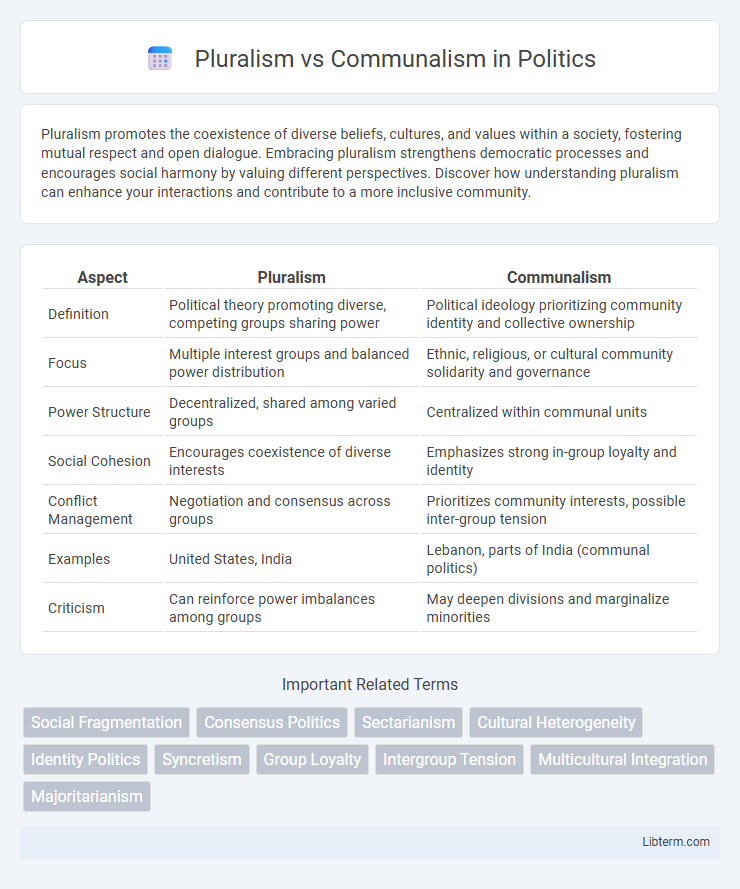Pluralism promotes the coexistence of diverse beliefs, cultures, and values within a society, fostering mutual respect and open dialogue. Embracing pluralism strengthens democratic processes and encourages social harmony by valuing different perspectives. Discover how understanding pluralism can enhance your interactions and contribute to a more inclusive community.
Table of Comparison
| Aspect | Pluralism | Communalism |
|---|---|---|
| Definition | Political theory promoting diverse, competing groups sharing power | Political ideology prioritizing community identity and collective ownership |
| Focus | Multiple interest groups and balanced power distribution | Ethnic, religious, or cultural community solidarity and governance |
| Power Structure | Decentralized, shared among varied groups | Centralized within communal units |
| Social Cohesion | Encourages coexistence of diverse interests | Emphasizes strong in-group loyalty and identity |
| Conflict Management | Negotiation and consensus across groups | Prioritizes community interests, possible inter-group tension |
| Examples | United States, India | Lebanon, parts of India (communal politics) |
| Criticism | Can reinforce power imbalances among groups | May deepen divisions and marginalize minorities |
Understanding Pluralism: Definition and Core Principles
Pluralism is a political and social philosophy recognizing the coexistence of diverse ethnic, religious, and cultural groups within a single society, promoting mutual respect and equal participation in governance. Core principles of pluralism include acceptance of diversity, protection of minority rights, and encouragement of dialogue and collaboration across different communities. This framework contrasts with communalism, which often emphasizes group loyalty and exclusivity, leading to sectarianism and conflict.
Communalism Explained: Origins and Key Characteristics
Communalism originated in the context of social and political movements emphasizing the organization of society around community-based principles, advocating for decentralized governance and ecological sustainability. Key characteristics of communalism include direct democracy, social ecology, and the rejection of hierarchical structures in favor of cooperative, self-managed communities. This ideology challenges dominant centralized state systems by promoting grassroots participation and collective ownership within local networks.
Historical Context: Evolution of Pluralism and Communalism
Pluralism emerged historically as societies diversified through trade, migration, and colonization, fostering coexistence of multiple cultural, religious, and ethnic groups within political frameworks. Communalism developed in response to identity-based mobilization, often intensifying during periods of social and political instability where communities prioritized sectarian or ethnic affiliations over national unity. The evolution of pluralism and communalism reflects the dynamic tension between integrative frameworks promoting inclusive governance and fragmentary forces emphasizing exclusive group identities.
Pluralism vs Communalism: Fundamental Differences
Pluralism embraces diversity by recognizing and encouraging multiple distinct cultural, religious, or ethnic groups to coexist with equal respect and political power, fostering inclusive dialogue and cooperation. Communalism, however, centers on strong allegiance to one's own community, often prioritizing its interests above others and potentially leading to social fragmentation and conflict. The fundamental difference lies in pluralism's promotion of unity through diversity, while communalism emphasizes exclusive group identity, frequently resulting in division.
Societal Impacts: Benefits of Pluralism
Pluralism fosters societal cohesion by promoting mutual respect and inclusivity among diverse cultural, religious, and ethnic groups, reducing social tensions and conflicts. It encourages democratic participation and equal representation, enhancing social justice and empowering marginalized communities. The benefits of pluralism include increased innovation, economic growth, and social stability through collaborative coexistence in multicultural societies.
Societal Impacts: Consequences of Communalism
Communalism fosters societal fragmentation by emphasizing rigid group identities, often leading to increased inter-community conflicts and social polarization. It undermines national unity and disrupts social cohesion, which can escalate into violence and long-term mistrust among diverse populations. The persistence of communalism hampers inclusive governance, economic development, and peaceful coexistence within multi-ethnic societies.
Pluralism in Modern Democracies
Pluralism in modern democracies emphasizes the coexistence of diverse social, ethnic, and cultural groups, ensuring equal participation and representation in political processes. It supports the protection of minority rights and encourages dialogue among various interest groups to maintain social harmony and democratic stability. This approach contrasts with communalism, which often prioritizes sectional identities and can lead to conflict and social fragmentation.
Communalism and Social Fragmentation
Communalism, characterized by strong identification with a particular religious, ethnic, or cultural group, often leads to social fragmentation by prioritizing group loyalty over national unity. This social division fosters mistrust, conflict, and polarization within pluralistic societies, undermining efforts toward inclusive governance and social cohesion. Persistent communal tensions can destabilize democratic institutions and hinder collective progress by entrenching sectarian interests.
Addressing Challenges: Promoting Pluralist Values
Promoting pluralist values addresses challenges by fostering inclusivity, mutual respect, and constructive dialogue among diverse communities. Emphasizing shared citizenship over sectarian identities helps reduce communal tensions and prevents conflicts driven by exclusive group interests. Educational initiatives and policy frameworks that champion equality and cultural diversity strengthen social cohesion and democratic resilience.
The Future of Pluralism and Communalism in a Globalized World
The future of pluralism and communalism in a globalized world hinges on balancing cultural diversity with social cohesion amid increasing interconnectedness. Pluralism offers a framework for coexistence by promoting inclusive policies and intercultural dialogue, while communalism emphasizes local identities and self-governance. Sustainable coexistence requires integrating pluralistic values with communal solidarity to address globalization-driven challenges like migration, multiculturalism, and identity politics.
Pluralism Infographic

 libterm.com
libterm.com